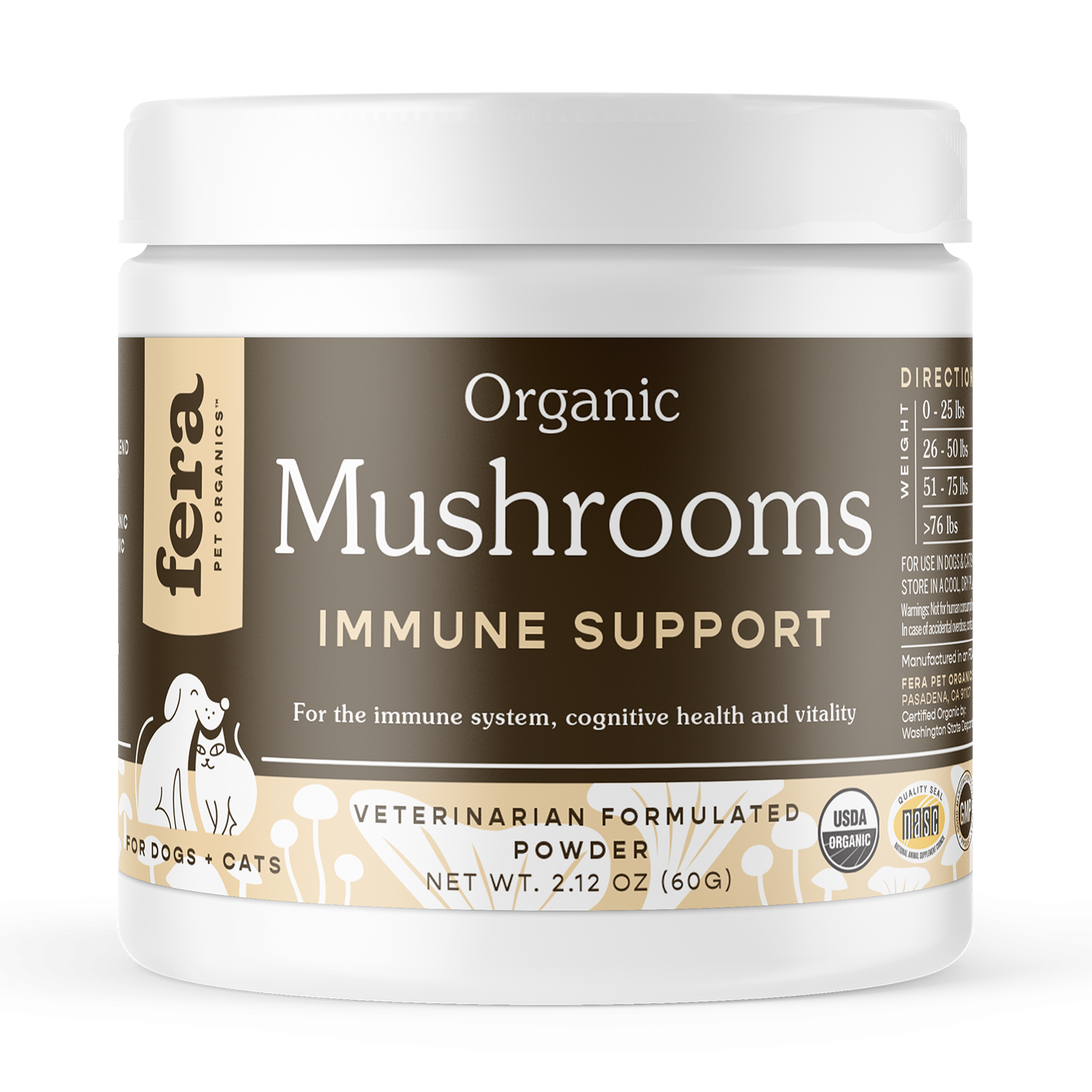Mushrooms: More Than Just a Tasty Meal to Help Boost the Health of Your Pets
Mushrooms have become a popular supplement for dogs and cats, with a variety of health benefits. Here’s how these fantastic fungi can help keep your pets healthy.
Mushrooms: More Than Just a Tasty Meal to Help Boost the Health of Your Pets
When you think of mushrooms, thoughts of a delicious dinner may come to mind first. However, mushrooms have been used for medicinal purposes in humans for a long time. They’ve also become a popular supplement for dogs and cats, with a variety of health benefits. If your pet suffers from allergies, needs an immune system boost, or you’re just looking to add a healthy dose of vitamins and minerals, adding a mushroom supplement can help. Here’s how these fantastic fungi can help keep your pets healthy.
Types of Mushrooms Used in Supplements
There are thousands of species of mushrooms in the world. Many edible mushrooms have been used for their medicinal purposes for hundreds, and even thousands of years. However, some mushrooms provide additional benefits that can support your dog or cats overall health.
One of the most commonly used mushrooms in supplements are Shiitake mushrooms. They contain lentinan, a polysaccharide that contains beta-glucans, which help boost the immune system. Turkey Tail mushrooms are also popular supplement additions, containing the same high count of polysaccharides and beta-glucans to reduce inflammation. Other popular types of mushrooms include Lion’s Mane, Chaga, Cordyceps, and many more. By including multiple types of mushrooms in a supplement, you can ensure your pet gets the perfect dose of body-boosting nutrients.
But what are polysaccharides and beta-glucans? A carbohydrate molecule made up of many smaller sugar molecules is called a polysaccharide. They’re found in many foods, and can have many benefits. Beta-glucans are one type of polysaccharide, found in mushrooms, cereal grains, and some bacteria. They provide many benefits to the body, including the reduction of inflammation and allergic responses.
Ways Mushrooms Can Help Your Dog or Cat
Adding medicinal mushrooms to your pet’s diet can help in many ways, including supporting allergy symptoms, a boost to the immune system, and as an additional source of antioxidants. However, not all mushrooms are safe to feed your pet, so it’s always best to consult with your veterinarian before starting a supplement. Some supplements can also interact with certain medications or diets, so your vet can help ensure that the supplement you want to give is safe. Be sure to also let your vet know if you notice any side effects, including minor digestive upset [1].
You can also look for a supplement such as Fera Pet’s Organic Mushroom Blend for Immune Support that is already naturally formulated and vet-approved for your dog or cat. By offering a premade blend of safe to eat and effective ingredients, you can ensure your pet receives the maximum benefits without worry.
Here’s more on the ways a mushroom supplement can help:
Support Your Pet’s Allergies Naturally
An allergy happens when the body mistakenly thinks a harmless item is attacking the body. Food, environmental triggers such as pollen, and even the body’s own immune system can cause allergies to trigger. As part of the allergic response, the body releases cytokines, which can cause inflammation, itchiness of the skin and ears, dry skin, red and runny eyes, swelling, and many more symptoms. You may notice your cat grooming themselves more often to the point of causing bald patches. Or, you may spot your dog shaking their head or licking their paws to the point of raw redness.
Luckily, natural supplements can help strengthen the immune system function and response. Recent research has shown that adding a mushroom supplement can help boost the immune system [2]. Many mushroom species, such as Cordyceps and Chaga have also been used in human medicine for years to boost the immune system. These mushrooms have potent anti-inflammatory effects, which can help with health issues such as arthritis or allergies. These benefits are also what helps regulate the immune system, reducing symptoms.
Boost the Immune System With Healthy Antioxidants
In addition, mushrooms contain a large number of antioxidants to help keep the body healthy. You may have heard of some of the more common sources of antioxidants, such as vitamin C and E. Antioxidants work by removing free radicals — the result of oxidative stress — in the body, keeping them from causing damage to joints, organs, and other cells.
Feeding your pet a diet high in antioxidants can help protect their body, and enhance cardiovascular function, energy, and blood pressure.
Add Extra Nutrients to the Diet
Mushrooms contain a number of beneficial nutrients that do more than just help with allergies or the immune system. They’re high in fiber, vitamins and minerals, and can even support healthy gut bacteria [3]. These benefits can help pets that have finicky digestive tracts by keeping their stools formed and healthy. And, they can help round out the nutrition for pets fed a homemade, hypoallergenic, or raw food diet. In addition, a mushroom supplement can also help with cardiac function through healthy antioxidant support, as well as support normal blood sugar levels.
The mighty mushroom is a great way to give your pet a nutritional boost. Whether your cat suffers from allergies or your dog from stiff joints, consider adding in a mushroom supplement to their daily diet. Their natural benefits can help keep your pet feeling their best.
Sources:
[1] Gollakner, R. (n.d.). Medicinal Mushrooms. VCA Animal Hospitals. Accessed 09 July 2024. https://vcahospitals.com/know-your-pet/medicinal-mushrooms
[2] Meng, M., & Wang, L. (2023, October). Ganoderma lucidum polysaccharide peptide (GLPP) attenuates rheumatic arthritis in rats through inactivating NF-ΚB and MAPK signaling pathways. Phytomedicine : International Journal of Phytotherapy and Phytopharmacology. Accessed 09 July 2024. https://pubmed.ncbi.nlm.nih.gov/37586160/
[3] Jacoby, L., & Higgs, V. (2023, October 6). Medicinal Mushrooms for Dogs. PetMD. Accessed 09 July 2024. https://www.petmd.com/dog/general-health/medicinal-mushrooms-for-dogs





